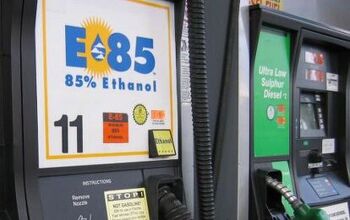E85 Boondoggle of the Day: Peak Oil is Food for Fuel's Friend
The Renewable Fuels Association (RFA)—the ethanol producer’s bestest best friend—is in a fight for its life. As the Wall Street Journal [sub] reports “The Environmental Protection Agency dealt a big blow to the ethanol industry earlier this year when it decreed that the corn-based fuel doesn’t have a much better carbon footprint than gasoline made with crude oil.” While the RFA lobbies the hell out of congress to subvert/get an exemption from the EPA’s final decree on the subject, they’re “counting the angels on the head of a pin” (quoth RFA CEO Bob Dinneen). Less poetically, what if peak oilers are right? If the supply of easily-extracted light sweet crude dries up, then it’s oil shale for us! And if you compare corn/theoretical sawgrass for fuel, well, then, huzzah! The RFA just happens to have a study that proves that ethanol beats the snot out of shale, carbon footprint-wise [ download pdf here]. Unless you count the carbon needed to produce the tires of the tractor harvesting the corn. Unwind that!
More by Robert Farago


































Comments
Join the conversation
Shale oil has a lower carbon footprint then ethanol ? You're hilarious mate !
I have often said that there is one thing that has almost universal agreement with regard to domestic energy policy - and gas for our toys. That is that no one really wants to send our money to unstable and often hostile foreign countries. Sure we are happy with Canada, possibly Mexico and Brasil, and the North Sea producers. But sending vast sums to the rest of the pack is the worst near term issue. Secondly, the long term [50-100 years]availability of affordable transportation fuel is not assured. So the alternatives today are limited and are being explored - unfortunately with a lot of political meddling. If - and its a big if - we in the US and other developed countries can keep our eye on the goal of reducing dependence on petroleum for transportation and incentivise the market to achieve that goal, we will end up having efficient and effective solutions and possibly avoid future energy crisis. Taxing/import duties or cap-and-trade programs are not incentives, they are politically driven wealth distribution programs wearing a disguise.